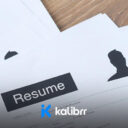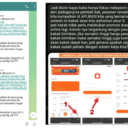A First-Time Jobseeker’s Anxieties

Putting yourself out there is never easy. At the back of our minds, we’ll always be asking ourselves— am I ready? Am I good enough?
First-time job applicants, I’ll let you in on a secret: It doesn’t matter as much as you think it does.
TOPICS
Where It Comes From
The penultimate, graduating, and recently graduated students of the pandemic are mostly anxious about whether or not companies would want to hire students who spent a chunk of their college lives online. We’re afraid of lacking knowledge and experience; and headhunters probably have the same concern.
But the fear stems from other places, too— our immediate peers, what we see on social media, and the unrealistic expectations we set for ourselves. However, I’ve come to learn that it all stems from the first-time job hunter’s unrealized nightmare: The immensely competitive environment, and not knowing where to fit in.
A Lack of Self-Awareness
Let’s dissect this— what advantage does a first-time applicant have in a sea of experienced jobseekers? If you don’t know, it’s probably because you’re unsure about your strengths and weaknesses.
We were taught that true success meant staying humble about our strengths and just letting our work speak for itself. While I agree with the sentiment, it’s this type of mindset that makes it difficult for us to talk about ourselves. We find ourselves unable to draw the line between humility and lack of self-awareness.
Now is the best time to let go of that belief and reflect on yourself. In doing so, you may end up learning things that could give you a competitive edge. Here are some points of reflection you can start with.
1. Your skills
Most people disregard their soft skills since they aren’t quantifiable, but remember that assets aren’t always technical. What you need to know how to do for your job will be developed as you work (unless you’re in a line of work that requires hands-on training, even in university). It’s good to include Photoshop and Microsoft Excel in your resumé, but it doesn’t hurt to add your work style and communication use as well. Your personality’s a bigger asset than you think. Understand it and use it to your advantage.
2. Your field/specialization
We usually enter specific fields thinking that it’s where we’ll find success, but after some time, they can definitely feel quite restricting. Don’t be afraid of questions like “How is your major relevant to this position?” if you’re applying for your dream job, but have an “unrelated” degree. Each program offers a unique set of skills that are adaptable to any position. For example, a diplomacy graduate could probably use their experience in trade and negotiation to strengthen their application in a business development role. It’s all about reframing your background to boost what you have to offer.
3. Your values
Believe it or not, this is something that businesses (big or small) take into consideration. Each business has a different vision-mission statement, story, and set of goals. They want employees that align with those, and as a jobseeker, you’d probably want to work somewhere that resonates with you as well. Find out what’s important to you, and look for places that match up.
Dispelling Your Fears
Finally, allow me to dispel some of the most common fears we have when applying for jobs.
1. I’m not qualified for the role.
Believe it or not, you probably are. When we worry about qualifications, we usually don’t mean the minimum requirements stated in the job listing. We’re worried about being relatively qualified compared to the people we think we’re competing with. While it’s true that there will always be someone who looks better on paper, different places look for different talents. Whether or not we’re qualified for the role is not our decision to make, and that alone should stop us from deciding upfront which opportunities aren’t for us. Let fate, destiny, and the HR Officer reviewing your application decide for you.
If you really don’t meet the technical qualifications for the job, worry not! You have time to make yourself qualified. Take an online course, a second degree, or self-learn a skill! You can even employ yourself in a role you’re qualified for, in the industry that you wish to be in.
2. Everyone’s handling this much better than I am.
I think it’s safe to say that applicants don’t know what they’re doing. The smartest, most experienced person you can think of probably still gets nervous when they send in job applications. Some people just hide it better. Try talking to a friend about it! While they’re sometimes competitors too (especially if you’re both applying for the same job functions), knowing that you’re not alone can give a really big confidence boost.
3. I’m at the mercy of my interviewer.
The interview is usually the final stage of the job application process. The thought that this could make or break your chances of getting in causes a lot of anxiety, but remember that the interviewer’s role is to get to know you. While it’s good to prepare, trying too hard to impress your interviewer may prevent them from getting vital information from you; ruining your chances of getting in.
4. My dream workplace is highly competitive and probably doesn’t want me.
There’s a lot of competition when it comes to big brands, and this causes tons of pressure on applicants. While I empathize with those who dream of those brands, make sure you want to work there for the right reasons (the environment and values, not just the salary and benefits). Accept that your acceptance there is out of your control. You can do what you can to prepare, but at the end of the day, they will select applicants that resonate with their values, vision-mission, and work style.
At the end of the day, we don’t have to trim vital parts of ourselves to fit into the mold of an ideal employee. If your values align with the company’s, then hope that the interviewer sees it, too. If not, keep searching. There are opportunities everywhere. All you have to do is take them.
Kalibrr is a recruitment technology company that aims to transform how candidates find jobs and how companies hire talent. Placing the candidate experience at the center of everything it does, we continue to attract the best talent from all over, with more than 4.7 million professionals and counting. Kalibrr ultimately connects these talents to companies in search of their next generation of leaders.
The only end-to-end recruitment solutions provider in Southeast Asia, Kalibrr is headquartered in Makati, Philippines, with offices in San Francisco, California, and Jakarta, Indonesia. Established in 2012, it has served over 18,000 clients and is backed by some of the world’s most powerful start-up incubators and venture capitalists. These include Y Combinator, Omidyar Network, Patamar Capital, Wavemaker Partners, and Kickstart Ventures.
For more tips on acing job interviews, follow Kalibrr on Facebook, Instagram, LinkedIn, and Twitter.





Belum ada komentar yang tersedia!